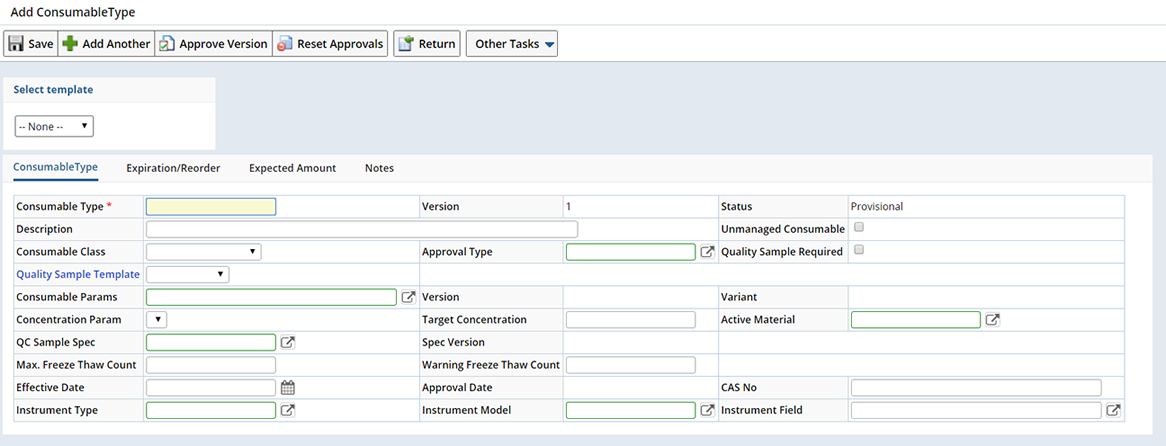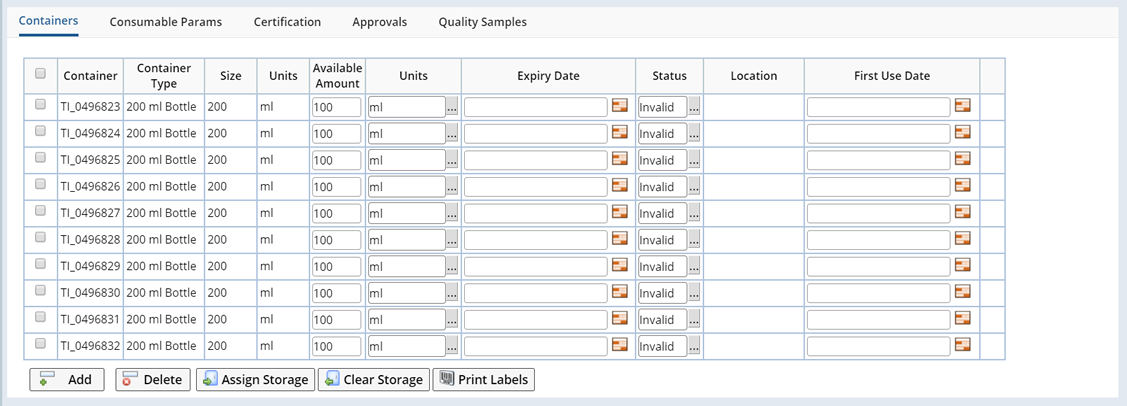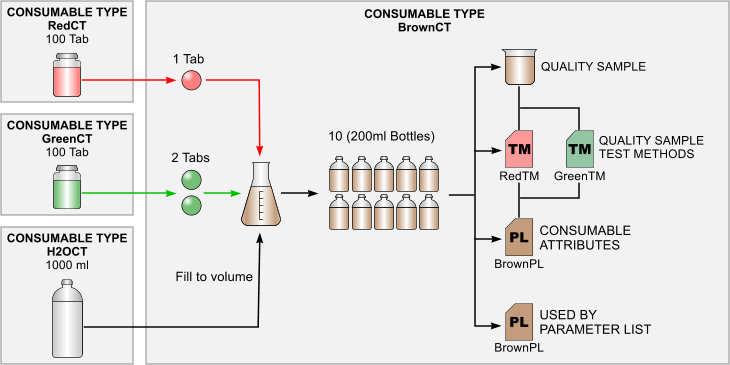This example covers settings required to use Consumables throughout LabVantage.
Consumable pages also contain some optional features not demonstrated by these
examples. Additionally, there are several ways you can perform these operations
in various orders. These features and variants serve no purpose in demonstrating
Consumable flow, and would result in confusion during a demonstration of overall
Consumable functionality. When you are up to it, optional features are covered
in these references:
In addition to example data supplied with LabVantage, this example assumes
the following items exist:
| Unit |
One Unit:
When creating this Unit, put it into the "Volume Units" Category. |
| Container Types |
Three Container types:
| 100 Tablet Bottle | | 1000 ml Bottle | | 200 ml Bottle |
|
| Parameter Lists |
Three Parameter Lists with these Parameters:
| Parameter List | Parameters | | RedPL | Red1 | | GreenPL | Green2 | | BrownPL | Red1 and Green2 |
|
| Test Methods |
Three Test Methods using these Parameter Lists:
| Test Method | Parameter List | | RedTM | RedPL | | GreenTM | GreenPL | | BrownTM | BrownPL |
|
| Consumable Mixing Stages |
Two Stages:
|
| Creating a Consumable Lot
|
We will create a Consumable Lot called "BrownCL".
To begin with, we will create three Consumable Types for "RedCT",
"GreenCT", and "H2OCT". These define the "Recipe"
for mixing Consumable Lot "BrownCL":
| Consumable Type
|
Quantity
|
From Container Type...
|
| RedCT |
1 Tablet |
100 Tablet Bottle |
| GreenCT |
2 Tablets |
100 Tablet Bottle |
| H2OCT |
Fill to volume |
1000 ml Bottle |
Next, we will create a fourth Consumable Type called "Brown" to use
as a template for creating Consumable Lot "Brown". This Consumable Type
defines the "Recipe":
| Consumable Type
|
Recipe
|
From Container Type...
|
After mixing, put in...
|
| BrownCT |
1 Tablet |
100 Tablet Bottle |
10 200 ml Bottles
(100 ml in each Bottle) |
| 2 Tablets |
100 Tablet Bottle |
| Fill to volume |
1000 ml Bottle |
For Consumable Type"BrownCT", you will also specify creation of a
"Quality Sample" (to test the Consumable itself), and define information
required to enter data for several aspects of Consumable use:
| Information
|
Use
|
| Quality Sample Test Methods |
Test the "Quality Sample". |
| Consumable Params |
Parameter List containing the Parameters that hold results of the Quality
Sample test.
Our example uses Parameter List "BrownPL", containing Parameters
"Red1" and "Green2". |
| Used By Parameter List |
Parameter List that uses Consumable Type "BrownCT"
for Data Entry.
Our example uses the "Alkali Metals" Parameter List. |
After creating Consumable Types, we will create three Consumable Lots for "RedCL",
"GreenCL", and "H2OCL". Each will inherit the Amounts
and Container Type defined by its respective Consumable Type. Each of these lots
generates a Trackable Item for its Container.
Next, we will create a fourth Consumable Lot for "BrownCL". In addition
to generating a Trackable Item for each container, it will specify the "Reference Data". These are the Parameters in the Parameter List defined by the
Consumable Type's "Consumable Params"... which will hold the results
of the "Quality Sample" test.
After all Consumable Types and Consumable Lots are created, you will:
| • |
Test and enter data for the "Quality Sample". |
| • |
Use the Consumable in Data Entry on the "Alkali Metals" Parameter
List. |
| • |
Use the Consumable in AQC as a control to test relative percent recovery. |
|
|
Add three Consumable Types called "RedCT", "GreenCT",
and "H2OCT":
|
| |
|
Open the Consumable Type List page (Lab Admin →
Process → Consumable Types) and click
"Add".
|
| |
|
For each of the three Consumable Types, specify only the information shown
in the table below (and nothing else), then Save each:
| NOTE:
|
|
After saving each Consumable Type, you can use the "Add Another"
button to add the next one. |
|

| |
RedCT
|
GreenCT
|
H2OCT
|
| Consumable Type
|
|
|
|
| Consumable Type |
RedCT |
GreenCT |
H2OCT |
|
|

| |
RedCT
|
GreenCT
|
H2OCT
|
| Expected Amount
|
|
|
|
| Expected Amount |
100 |
100 |
1000 |
| Expected Amount Unit |
Tablet |
Tablet |
ml |
| Container Type |
100 Tablet Bottle |
100 Tablet Bottle |
1000 ml Bottle |
Check the Manage Container Inventory Flag in order to see Container
Information during Data Entry.
|
|
|
|
Add a fourth Consumable Type called "BrownCT":
|
| |
|
Open the Consumable Type List page (Lab Admin →
Process → Consumable Types) and click
"Add".
|
| |
|
Specify only this information (and nothing else):
|

| Consumable Type
|
|
| Consumable Type |
BrownCT |
| Quality Sample Required |
Check this. |
| Quality Sample Template |
Any Sample Template will do... such as "QC". |
| Consumable Params |
BrownPL |
|
|

| Expected Amount
|
|
| Expected Amount |
1000 |
| Expected Amount Unit |
ml |
| Expected No of Containers |
10 |
| Container Tracking Method |
Individual |
| Container Type |
200 ml Bottle (we're putting this Consumable
into 10 200ml Bottles) |
|
|
| |
|
Save this, then specify only the following information (and nothing
else):
|


| Recipe
|
| Consumable Type |
Amount |
Unit |
| RedCT |
1 |
Tablet |
|
| Consumable Type |
Amount |
Unit |
| GreenCT |
2 |
Tablet |
|
| Consumable Type |
Fill to Volume |
| H2OCT |
Check this. |
|
Note that when saved the Recipe is ordered and grouped by Stage.

|
|

| Quality Sample Test
Method
|
| Test Method |
| RedTM |
| GreenTM |
|
|
|
|
|
Add three Consumable Lots called "RedCL", "GreenCL",
and "H2OCL":
|
| |
|
Open the New Consumable Lot List page (Consumables →
New Consumable Lots).
|
| |
|
NOTE:
|
|
"Receive Consumable" is intended for use with Consumables purchased
from a vendor.
"Mix Consumable" is intended for use with Consumables you are mixing. |
| |
|
For each of the three Consumable Lots, click "Mix Consumable",
specify the "Consumable Type" and "Description" as
shown below, then Save it:
|

| |
RedCL
|
GreenCL
|
H2OCL
|
| Consumable Lot
|
|
|
|
| Consumable Type |
RedCT |
GreenCT |
H2OCT |
| Description |
RedCL |
GreenCL |
H2OCL |
| NOTE:
|
|
Consumable Lot identifiers are automatically generated. |
|
|
| |
|
Note the inheritance for each (you don't have to enter anything):
|

The Amounts are inherited from each
Consumable Type (RedCL is shown above as an example):
| |
RedCL
|
GreenCL
|
H2OCL
|
| Amounts
|
|
|
|
| Initial Amount |
100 |
100 |
1000 |
| Amount Unit |
Tablet |
Tablet |
ml |
| Container Type |
100 Tablet Bottle |
100 Tablet Bottle |
1000 ml Bottle |
|
|
| |
|
In each Consumable Type, you did not specify a "Quality Sample"
or "Approvals", each of these Consumable Lots changes to "Active"
after you save them. See Consumable
Lot Status to view the life cycle.
Note the "Containers" tab. The Containers are inherited from
each Consumable Type (H20CL is shown below as an example):
|

| |
RedCL
|
GreenCL
|
H2OCL
|
| Containers
|
|
|
|
| Container |
TI generated by
RedCT Consumable Type |
TI generated by
GreenCT Consumable Type |
TI generated by
H2OCT Consumable Type |
| Container Type |
100 Tablet Bottle |
100 Tablet Bottle |
1000 ml Bottle |
| Available Amount |
100 |
100 |
1000 |
| Unit |
Tablet |
Tablet |
ml |
|
|
|
|
Add a fourth Consumable Lot called "BrownCL". Specify the Consumable
Type and Description:
|
| |
|
Open the New Consumable Lots List page (Consumables →
New Consumable Lots) and click "Mix Consumable".
|
| |
|
Specify the Consumable Type and Description:
|

| Consumable Lot
|
|
| Consumable Type |
BrownCT |
| Description |
BrownCL |
|
|
| |
|
Note the inheritance (you don't have to enter anything):
|

The Amounts are inherited from Consumable
Type "BrownCT":
| Amounts
|
|
| Initial Amount |
1000 |
| Amount Unit |
ml |
| Container Type |
200 ml Bottle |
| Initial Containers |
10 |
| Container Tracking Method |
Individual |
|
|
| |
|
Under the Recipe tab, the three Consumable Types are inherited from the
"BrownCT" Consumable Type:
|

| Recipe
|
|
|
|
For each Consumable Type, note that:
| • |
"Consumable Lot" and "Container"
are used only if you want a specific Consumable Lot or
Container. Choosing either of these automatically populates
the other. |
| • |
"Use Amount" and "Amount Unit"
for "RedCT" and "GreenCT" are inherited
from each Consumable Type. |
| • |
For "H2OCT", "Use Amount" is not
inherited from the Consumable Type because it was "Fill
to Volume". |
|
|
|
|
|
|
|
| |
|
Note the information under the Containers tab:
|

The Amounts are inherited from Consumable
Type "BrownCT":
| Containers
|
|
| Container |
Shows the automatically-generated TrackItemId
that has been created to track each Container. |
| Container Type |
Shows the 200 ml Bottle. |
| Available Amount and Unit |
Shows that 100 ml is available. Since 1000
ml will be put into 10 Containers, the Available Amount in
each is 100 ml. |
| Status |
Container status is "Invalid".
It should change to "Valid" when the status of the
Consumable Lot changes to "Active". See Consumable
Lot Status to view the life cycle. |
|
|
| |
|
Note that "Consumable Params" shows the Parameters in the
Parameter List specified by "Consumable Params" in Consumable
Type "BrownCT":
|

| Reference Data
|
|
Parameter
Type
Replicate |
Shows "Red1" and "Green2". |
Display Value
Units |
After you enter data for the Quality Sample,
the "Display Value" will show the entered data.
|
|
|
| |
|
Note that "Quality Samples" shows the Quality Sample generated
by Consumable Type "BrownCT" (because you told it to generate
a Quality Sample):
|

| Quality Samples
|
|
Sample
Description
Sample Type
Status |
Shows information about the Quality Sample. |
|
|
| |
|
One last thing to note... "Certification" shows Parameter
Lists that can use this Consumable Lot. By default, the asterisk wildcard
is always automatically inserted, indicating all Parameter Lists can
use it:
|

| Certification
|
|
| Parameter List |
* |
| Certification Type |
Consumable Certification |
|
|
| |
|
Return to the New Consumable Lots List page. Since this Consumable Lot has
a "Quality Sample", click the "Activate" button
and provide the required ESig authorization. See Consumable
Lot Status to view the life cycle.
All Consumable Lots are now "Active" and can be viewed in the Consumable
Lots List page (Consumables → Consumable Lots).
|
|
|
|
|
Add Consumable Type to Parameter List
|
|
|
|
|
|
Edit the "BrownPL" Parameter List and add the "BrownCT"
Consumable Type to the Parameter List (necessary before using the Consumable in
data entry). Do this in the Consumable
Types detail of the Parameter List Maintenance page for the "BrownPL"
Parameter List. Under the "Consumable Types" detail, specify these
values, then save the Parameter List:
Parameter List Maintenance Page for "BrownPL"
| Consumable Types
|
| Consumable Type |
Version |
Use Amount |
Unit |
| BrownCT |
1 |
2 |
ul |
|
|
|
|
|
Enter Data for the Quality Sample
|
|
|
|
|
|
|
|
Enter data for the "BrownCL" Consumable Lot's Quality Sample:
|
| |
|
In the Sample List page, select the Quality Sample, then click DataEntry.
|
| |
|
Enter these values for the Quality Sample (recall that the Test Methods
are the Quality Sample Test Methods defined by the "BrownCT"
Consumable Type (RedTM and GreenTM):
| Parameter |
|
Enter |
| Green2 |
|
100 |
| Red1 |
|
200 |
|
|
|
Review the Quality Sample:
|
| |
|
Select the Quality Sample, click "Review", then change the
"Disposition" to "Approved".
Click "Review" and provide the required ESig authorization.
|
| |
|
Open the Consumable Lots List page (Consumables →
Consumable Lots) and edit the "BrownCL" Consumable Lot.
|
| |
|
Look under the "Consumable Params" tab. The "Display
Value" shows the values you just entered for the Quality Sample's
Parameters (Red1 and Green2).
|
|
|
|
|
Use a Consumable in Data Entry
|
|
|
|
|
|
|
|
Create a Sample and add the "BrownTM" Test to it.
|
|
|
Open data entry for this Sample:
Click "Choose Consumable". This opens the Consumables Data Entry
page. This page lets you select multiple Consumables for multiple Samples
that share the same Test.
|
To use a Consumable in AQC, you must have a Test Method that has the same Parameters
as the Consumable Lot's "Reference Data". In this example, Consumable
Lot "BrownCL" defines Parameters "Red1" and "Green2".
The "BrownTM" Test Method has these Parameters.
Create this using Lab Admin → Tests
→ Test Methods. The Parameter List is
the one specified by the "Consumable Params" tab of the "BrownCT"
Consumable Type which, in our example, is Parameter List "BrownPL".
| QC Method |
NaCl |
| Test Methods |
Add the "BrownTM"
Test Method. |
| QCMethodSampleTypes |
Add a Control in the first position. |
| Consumable Type |
Choose "BrownCT".
For the Amount, enter 30ul. |
| Calculation
Action |
Choose "QCCalcCtrlPRecovery"
(this is relative percent recovery). |
| QC Batch |
This is automatically generated. |
| QC Method |
Choose the "BrownTM"
QC Method. |
| QC Batch
Items: |
Add an Unknown (click "Add Unknown Samples" and choose a
Sample that has been Received). The Consumable (Control) will be in the
first position, and Unknown in the second.
When redirected to the Batch Maintenance page, you have to choose
two types of Controls: | • | Under the QC Batch SampleTypes tab, choose the "BrownCL"
Consumable Lot corresponding to the Container that has the Control. | | • | Under the Consumables tab, choose the "BrownCL" Consumable
Lot to be used in every position. |
|
|
|
In the QCBatchList page, choose the Batch you just created, then click
Data Entry.
For both the Control and Unknown, enter these values for Red1 and Green2,
then Save: | Parameter | | Enter | | Red1 | | 50 | | Green2 | | 100 |
The relative percent recovery should return: | Parameter | | Entered Value | | Rel%Recovery | | Red1 | | 50 | | 25 | | Green2 | | 100 | | 100 |
|
Here's the story:
| • |
We did a relative percent recovery test on the QC Batch. But in order
to test the unknown, we must also test the known (the solution of this
particular Container of this particular Consumable Lot). So... |
| • |
We tested the Control and entered the data for the Control (50 for "Red1"
and 100 for "Green2"). |
| • |
Consider that relative percent recovery is a percentage of the actual
value calculated by AQC... ideally 100%. We know the actual value is 200
for "Red1", and 100 for "Green2". These are the results
of the Quality Sample test indicated in the "Reference Data"
tab for the "BrownCL" Consumable Lot. So...
| Parameter | | Entered Value | | Reference Data | | Relative Percent Recovery | | Red1 | | 50 | | 200 | | 25 | | Green2 | | 100 | | 100 | | 100 |
|






























